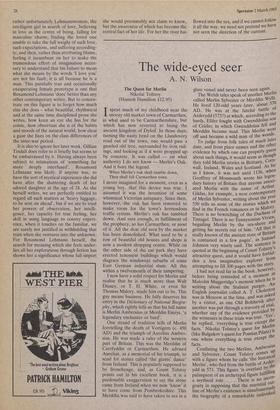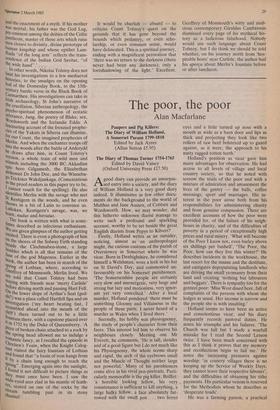The wide-eyed seer
A. N. Wilson
The Quest for Merlin Nikolai Tolstoy (Hamish Hamilton £12.95)
Tspent much of my childhood near the
snoozy old market town of Carmarthen, in what used to be Carmarthenshire, but which has now reverted to being the ancient kingdom of Dyfed. In those days, turning the nasty bend on the Llandovery road out of the town, one would pass a gnarled old tree, surrounded by iron rail- ings, and looking as if it were propped up by concrete. It was called — on what authority I do not know — Merlin's Oak. And it bore the legend.
When Merlin's oak shall tumble down, Then shall fall Carmarthen town.
I never imagined for a moment, even as a young boy, that this device was true. I assumed it was the invention of some whimsical Victorian antiquary. Since then, however, the oak has been removed to make room for the town's horrendous traffic system. Merlin's oak has tumbled down. And sure enough, in fulfillment of the prophecy, so has Carmarthen; or most of it. All the dear old area by the market has been demolished. What used to be a row of beautiful old houses and shops is now a modern shopping centre. While on the other side of the car park they have erected tenement buildings which would disgrace the windswept suburbs of some East German industrial slum. All this within a twelvemonth of their tampering.
I now have a solid respect for Merlin and realise that he is much more than Walt Disney, or T. H. White, or even Sir Thomas Malory, made him out to be. This guy means business. He fully deserves his entry in the Dictionary of National Biogra- phy, which rightly tells us that his full name is Merlin Ambrosius or Merddin Emrys, 'a legendary enchanter or bard'.
One strand of tradition tells of Merlin foretelling the death of Vortigern (c. 450 AD) and the triumph of Aurelius Ambro- sius. He was made a ruler of the western part of Britain. This was the Merddin of Caerfyddin or Carmarthen. He advised Aurelius, as a memorial of his triumph, to send for stones called 'the giants' dance' from Ireland. This is popularly supposed to be Stonehenge, and, as Count Tolstoy points out in his excellent book, it is a pardonable exaggeration to say the stone came from Ireland when we now 'know' it to have come from Pembrokeshire. This Merddin was said to have taken to sea in a glass vessel and never been seen again. The Welsh tales speak of another Merlin called Merlin Sylvester or Merddin Wyllt.
He lived 120-odd years later, about 570 AD. He was at the fateful battle of Arderydd (573?) at which, according to the bards, Elifer fought with Gwenddolau son of Ceidio; in which Gwenddolau fell and Merddin became mad. This Merlin went off and became a wild man of the woods. To judge from folk tales of much later date, and from place names and the other evidence by which one can properly guess about such things, it would seem as though they told Merlin stories in BrittanY, C°111- wall, Ireland, Wales and Scotland. As far as I know, it was not until 1136, when Geoffrey of Monmouth wrote his legen- dary history of Britain that anyone associ- ated Merlin with the name of Arthur. Gildas, for example, a near contemporary of Merlin Sylvester, writing about the year 550 tells us none of the stories which we find in the French romances or in MalorY. There is no bewitching of the Duchess of Tintagel. There is no Tennysonian Viviefl beguiling Merlin by the sea-shore and getting his secrets out of him. 'All that is really known of the ancient state of Britain is contained in a few pages', as Sainne) Johnson very wisely said. The sentence is ,quoted at the,beginning of Count Tolstoy s attractive quest, and it would have forbid- den a less imaginative explorer from attempting to fill 300 pages with the storY. I had not read far in the book, however, before being reminded of a moment in Malcolm Muggeridge's memoir when he Is writing about the Stalinist purges. An English journalist called A. T. Cholerton was in Moscow at the time, and was asked by a visitor, as one Old Bolshevik after , another was put through a travesty of trial, whether any of the evidence provided by the witnesses in these trials was true. he replied, 'everything is true except the facts.' Nikolai Tolstoy's quest for Merlin (like Bulgakov's quest for Pontius Pilate) is one where everything is true excePt the facts. Conflating the two Merlins, Ambrosius and Sylvester, Count Tolstoy comes .UP with a figure whom he calls 'the histonca Merlin', who fled from the battle of Arden!: ydd in 573. This figure 'is overlaid by .t"' palimpsest of an archetypal figure fulfilling a mythical role . . . . There is no incon- gruity in supposing that the essential out- line of Merlin's existence is simultaneo. uslY_ the biography of a remarkable individual and the enactment of a myth. If his mother Was mortal, his father was the God Lug, Pre-eminent among the deities of the Celtic Pantheon, master of those arts which raise men closest to divinity, divine prototype of human kingship and whose epithet Lam- fhada "of the long arm" reflects the trans- cendence of the Indian God Savitar, "of the wide hand" In other words, Nikolai Tolstoy does not limit his investigations to a few mediaeval histories, to the smudges on the opening leaf of the Domesday Book, to the 13th- century bardic verse in the Black Book of Ca, rmarthen. His investigations can take in insh archaeology, St John's narrative of ihe crucifixion, Siberian anthropology, the PsYcho-spiritual phenomenon of ecstatic utterance, Jung, the poetry of Blake, sex, Wordsworth and the Icelandic Edda. A fascinating account of the frenzied prophe- cies of the Yakuts in Siberia can illumine, for our Count, the imagined prophecies of Merlin. And when the enchanter troops off Into the woods after the battle of Arderydd he draws after him, in Count Tolstoy's version, a whole train of wild men and wizards including the 3000 BC Akkadian epic hero Gilgamesh, the Elizabethan alchemist Dr John Dee, and the Winneba- go Trickster Wakdjunkaga. (Conscientious as the proof-readers in this paper try to be, ! cannot vouch for the spelling). He also identifies Merlin with the savage who met Sr Kentigern in the woods, and he even throws in a bit of Latin to convince us. ralloken, Kentigern's savage, was, we learn, nudus and hirsutus. f. The book is written with what is some- nes described as infectious enthusiasm. we .are given glimpses of the author getting excited. There is even a photograph of him na the shores of the Solway Firth standing beside the Clochmaben-stone, a large raider which is all that remains of the tane of the god Maponos. Earlier in the b00k, the author has been in search of the s,Pring of Lothian, where, according to ueoffrey of Monmouth, Merlin lived. We are told that Count Tolstoy had been ttaying with friends near 'merry Carlisle' uefore driving north and passing Hart Fell. (3.11 the lower slope of Arthur's Seat (ged- cl. lt?) was a place called Hartfell Spa and on Investigation env heart beating fast, I scrambled ahead into the mouth of the eclefr) there turned out to be a little ,tou. ntain there, with a capstone placed over 1752 by the Duke of Queensberry. 'A Piece of broken chain attached to a rock by the spring head allowed me to indulge a roMantic fancy, as I recalled the episode in Chretien's Yvain, when the Knight Calog- rant visited the fairy fountain of Lothian a. nd found that "a basin of iron hangs from bY a chain long enough to reach the ftring". Emerging again into the sunlight, round it not difficult to picture things as th.eY must once have been. I saw the wide-eyed seer clad in his mantle of feath- ers, seated on one of the rocks by the stream tumbling past in its stony charmer'. . It would be churlish — absurd — to criticise Count Tolstoy's quest on the grounds that it has gone beyond the bounds which pedantry, or even scho- larship, or even common sense, would have delineated. This is a spiritual journey, ending with a magnificent peroration that 'there was no return to the darkness (there never had been any darkness); only a foreshadowing of the light.' Excellent. Geoffrey of Monmouth's witty and mali- cious contemporary Giraldus Cambrensis dismissed every page of his mythical his- tory as a ludicrous falsehood. Nobody would use such language about Count Tolstoy, but I do think we should be told whether, on his journey north from 'hos- pitable hosts' near Carlisle, the author had his apercu about Merlin's fountain before or after luncheon.















































 Previous page
Previous page